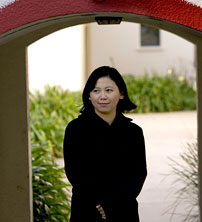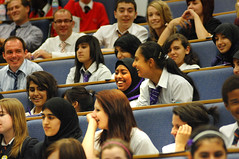Yiyun Li grew up in Beijing and came to the United States in 1996 to study immunology at the University of Iowa, with no intentions of being a writer and no knowledge of the Iowa Writers Workshop. Fortunately, for those of us who believe that words have at least as much power to save us as medical science, Li discovered her true calling in Iowa. As a result, she’s has already given us three books. Li’s debut collection, A Thousand Years of Good Prayers, won the Frank O’Connor International Short Story Award, PEN/Hemingway Award, Guardian First Book Award, and California Book Award for first fiction; it was also shortlisted for the Kiriyama Prize and the Orange Prize for New Writers. Her recent novel, The Vagrants, takes place in China in the late 1970s and chronicles the local impact of a young woman’s politically motivated execution. The Vagrants was chosen as an American Library Association Notable Book. Her second story collection, Gold Boy, Emerald Girl, which she wrote simultaneously to The Vagrants, released in September of this year.
Li’s stories and essays have been published in the New Yorker, Best American Short Stories, and the O Henry Prize Stories, among others. She has received fellowships and awards from the Lannan Foundation, the Whiting Foundation, and the MacArthur foundation. She was selected by Granta as one of the 21 Best Young American Novelists under 35 and was recently featured in the New Yorker’s 20 Under 40 Fiction Issue. She is a contributing editor at the Brooklyn-based literary magazine, A Public Space. She lives in Oakland, California with her husband and their two sons, and teaches at the University of California, Davis.
I had the genuine pleasure of speaking with Li when she visited Ann Arbor, Michigan, this past spring as part of the Zell Visiting Writers Series. We discussed what it means to be an American writer; the elusive process of revision; the art of transforming stories into screenplays; the act of talking aloud to famous dead writers; and how to balance writing alongside parenting, teaching, and all of life’s myriad responsibilities.
Interview
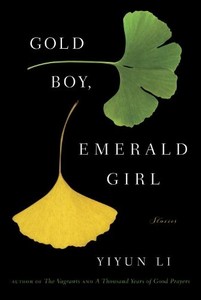 ANGELA WATROUS: You initially came to the United States to study immunology at the University of Iowa, and took a writing course to improve your English. How long was it before you shifted course altogether?
ANGELA WATROUS: You initially came to the United States to study immunology at the University of Iowa, and took a writing course to improve your English. How long was it before you shifted course altogether?
YIYUN LI: Oh, a while. I stayed in immunology for three more years.
Did you write during that time?
Yes, I was writing, just all by myself.
Were there signs earlier in your life that you might become a fiction writer?
I was always a big reader, and I read a lot of things that I did not understand. So I had not read many children’s books; from the time I started reading, I read grownup’s books. Also I have a very good memory; that’s actually very helpful. But I did not think about writing at all at the time.
Do you have your kids read children’s books?
Well, they do. I mean, I buy a lot of children’s books for them. When they move into chapter books…I can’t bear to even look at the chapter books. Because some of them are so horrible, and I cannot stand them. I would be all for them reading books they don’t understand, but they haven’t started. I mean, they’ve started a little.
How do your early scientific studies impact your approach to writing, in terms of process or content?
Discipline is one thing you learn from science. That’s probably the biggest gain from my science career. You do your thing, and you do that every day. You have to dedicate a certain amount of time. Back then I used to be more interested in the shape and the mathematics of stories and novels; now I have overgrown that stage. When I first started writing, I thought a lot about the shape of the stories—do you have a triangle or a rectangle, or do you have a mirror image? Is one character a mirror image of the other? What variation did you do with the characters to make that interesting? All these really geometrical and mathematical questions I did with stories. And now I don’t do it anymore.
Do you think that is because it’s more intuitive for you now?
Yes, I think so. I think in the beginning, I used to be able to say, I want to write a fifteen-page story, and on page seven, something would happen—you know, I’d figure a number out. Now that I’ve written so many years, I don’t feel that I need to do that anymore; I’m just writing, sentence to sentence.
And it comes out the way it needs to?
I also think maybe I’m less afraid of making mistakes now, because I used to be unable to revise really well, so the stories the first time had to come out very right. Otherwise there’s no way for me to fix a story. I do think I’ve learned to revise a little bit more than before. So now if a first draft doesn’t come out absolutely right, it’s okay, I will just go in there and fix it.
Is that to say that some of your early stories are first drafts? Or just that the general shape of them is how they came out?
Most of my earlier stories are one-draft stories.
The ones that have been published?
Yes. I would do a little work on the line, but nothing really got changed. I used to say, “Oh, you can only write one draft, and if that draft doesn’t work, you cannot revise on that draft, you have to start all over.” Which was what I did. But now I’m glad I have matured a little, to know how to revise.
So when you were writing those one-draft stories, were there ever ones that you wrote a draft of, weren’t happy with it, and ditched altogether?
Yes.
You didn’t try again with the same story?
Oftentimes if a story did not work, I would rescue one character or two characters—or one paragraph—from the story and start all over. Which actually was very efficient for me, I think. You can spend so much time revising.
Did you then spend a lot of time thinking through the stories beforehand?
Yes.
So in a sense you were almost revising before you were writing.
Yes. I think, especially earlier, when my children were younger, I did not have much time to do real writing, so I suppose I was constantly writing in my mind, and then revising, and then when I got to the page, I think they were pretty much there.
I’ve read that you write in English, but that you think through things a lot in everyday life in Chinese.
That has been constantly changing. Now I think about a lot of things in English. But I do my math in Chinese. I count in Chinese. Those things you learn very early in life.
Has your native language impacted your use of the English language and your style of English prose?
When you did not grow up with a language, for me I feel I never will have the intimacy with English as you would have, because you grew up with it. There’s always this distance between me and the language. To me, that’s a good thing, because you’ll always be pushing to get closer. You know you’ll never get there, you’ll never get a perfect story, but you’re trying. I would not want to do a lot of tricks with English. On a language level, I’m just interested in telling stories with clarity, and some decent rhythm.
Do you consider yourself an American writer or a Chinese writer? And how would you define what you think an American writer is?
No, I don’t feel like I can call myself an American writer. I mean, I’m American-trained, I would say. Definitely, I’m not a Chinese writer. One thing, I don’t live in China, and second, I don’t write in Chinese. I would love to be called an international writer, because that’s the only thing I can fit myself in. I feel like my writing is very removed from your everyday American life, the life I have not lived in this country. On the other hand, really anybody could be an American writer. So if I write about America, I think I could [whispers] pass as an American writer.
For instance, in A Thousand Years of Good Prayers, your characters are living in the United States, and really grappling with the idea of what America means, and in some ways that seems to me like an American sensibility.
Right, right. I think that’s true. Yes. [Laughs.] I agree with you.
Speaking of being an American, in 2006 the United States government denied your application for permanent residency. What is the update on that?
That has been resolved.
So you’re a permanent resident of the United States?
Yes.
Are you a citizen?
No, I have to wait for five years before I apply for citizenship.
Is that your intention?
I think so. Yes, there are reasons I’d like to become a citizen.
I ask because you write so much about China, and yet you live here. I’m curious how that impacts your identity as a writer, your experience.
It’s so funny, because I’ve never had an identity crisis. I don’t think about my identity much. I think when you think about identity, you’re thinking about your relationship with the world, you’re thinking about where you’re positioned in the world, or where you’re positioned in America or in China or between the two countries. To me, writing is a very private thing. Writing is really what I’m sitting in my house and doing. I guess my real writing self doesn’t go out to the world, so that self is not bothered by my identity.
How has your work been received in China?
The books are not translated into Chinese. English copies are available, but only a limited [number], so I don’t know.
Has your family in China read your work?
My father reads English, so he has. My mother doesn’t read English.
What was his response?
He will not say, and also I would not want him to read.
You wouldn’t want him to read, or to say?
No, I don’t want him to read. But he reads. I cannot help with that. But I also don’t want to hear, I guess, what he has to say.
What initially sparked the idea for The Vagrants?
That was in the news on the Internet about these two women. The first woman was executed, and, pretty much as the book says, her body was raped, her kidneys were taken out, and there was a protest on her behalf, and the woman who led the protest was executed. When you see something like that, and you’re a novelist, you think that’s the shape of a novel. It’s a story you cannot really tell within twenty pages. And that book ends with two executions, which is perfect for a novel. That’s where it started.
In a Publisher’s Weekly interview last year, you talked about walking around your neighborhood with your mother, reading about who was going to be executed, and also about going to see a denunciation when you were five or six. At the same time, you’ve said in interviews that your work is not autobiographical. How do you define autobiography, and how often does your writing relate to your experience?
I imagine autobiographical writers are writers who write about their own lives and their life stories. There’s a difference to me between your life and your memories. Of course I have memories about my own life, my own family, but a lot of memories I carry with me are about the world. And those are not—I don’t think those can be called—autobiographical. Those are really observations. I remember these things, but you have to make sense of these memories by writing other people’s stories, rather than your own stories. Does that answer your question?
Yes. You had talked about how, in particular, you had known a girl who had a disability, similar to one of your characters. How often does that come up for you? How often are your characters based on someone you’ve met?
Some of the characters—I wouldn’t say many—some of them are based on people either I’ve met or stories I’ve heard about. But most of the time they’re people I really did not know well. To me that’s very helpful, because if you know someone very well, you’re taking a lot of shortcuts. You’re not imaging their lives. So even though I take, say, the girl who was disabled or had birth defects, even though I took these things from life, they’re only seeds of these characters. The real characters don’t come from these people. The real characters really just grow out of your imagination.
In their review of The Vagrants, Elle magazine said, “Familiarity with Chinese history isn’t at all necessary to relate to the grief, pain, confusion, fear, loyalty, suspicion, and love portrayed by the characters in this deeply affecting story.” It seems like a good number of these reviewers feel the need to reassure American audiences that they’ll be able relate to your stories.
That’s why we write, right? There’s a difference between fiction and the news report. You can report something about another world, but you don’t really have to go inside the characters’ minds. I feel there is a difference between presenting the surface to the readers, and presenting the internal to the readers. If you take ethnicity and nationality and skin color, these things are like clothes. You may have different layers of clothes. But then if you take all the layers off, when you go really into people, I think people really feel and think very similarly.
You’ve said this novel is a way for you to question heroism. Can you talk more about that? Do you think of your own work an act for or against heroism?
I’m not for heroism, because heroes are pretty much glorified, like martyrs. You have to put them into a position where they’re not human anymore, they’re beyond human. I’m not interested in the black and white of the world; I’m interested in the different shades of grays in between. I think that’s what fiction does. To me, that’s what you do as a fiction writer. When you are interested in the grayness of human beings, or human situations, that means nobody can be a hero, because that’s absolute. It’s so absolute it’s not possible. I grew up in this culture where heroism was a big thing. If you think the book was a rebellion, the only rebellious thing about that book was that I really wanted to question that and say, “Really, there’s no hero.” Nobody was really the hero in the end. Nobody was purely evil, either.
While you were at the University of Iowa, you earned MFAs in both nonfiction and fiction. Why both? How has that informed your work in both genres?
Oh, I got into the nonfiction program because I really needed a student visa to leave my job, and I applied to both fiction and nonfiction and I didn’t get into the fiction. So that’s why I took one year of nonfiction. My inclination was not to write nonfiction, but what I got from nonfiction was that I can write nonfiction. Because I hate to write about myself and talk about myself, but I realized there are ways to write nonfiction that’s really not about yourself, but about the world. That makes me very happy.
Speaking of different forms, you wrote the screenplay for A Thousand Years of Good Prayers. How did writing the screenplay differ from writing the story?
You know, at first, it felt very different. But after so many drafts, I realized that writing a screenplay is actually very close to a story. It’s different from writing a novel, but I think a screenplay is very close to a story. But I’ll give you sort of the little history of that. I’d never written a screenplay, and Wayne [Wang], the director, gave me some software after I asked, “How do you write a screenplay?” He said, “Well, here’s the software, go home and figure out.” Which is really ridiculous, but also was very helpful. The software gave me the format—day, night; inside, out. The software really provides that scaffolding for your story. But after I wrote a draft and showed him, he said, “Agh, this is not a screenplay! It’s a regular play. The characters talk all the time.” He said, “I need to be able to direct. And when your characters talk all the time, actors cannot act, directors cannot direct.” Which was illuminating to me. I realized it’s the same thing. When you write fiction, you’re always told to show not tell, which I strongly disagree with. We say “storyteller,” we never say “storyshower,” because stories are told, not shown.
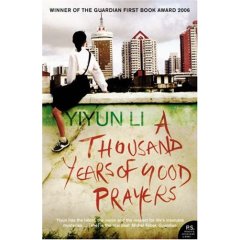
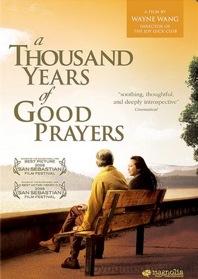
In any case, I went back to the screenplay. Wayne was very helpful. He said, “I want forty percent of silence in your script. Forty percent of silence—they cannot talk.” I realize that when they don’t talk, you’re actually writing about real things. You’re doing a lot of summary, too, and that’s a very important skill in fiction. You don’t have to show everything. I know that’s what a lot of younger writers would say. They would give you dialogue to give you information, which is the most inefficient and artificial way to give information, right? You can just tell your readers. So I did a few drafts of the screenplay, and I thought, Oh, this is so easy. This is exactly as when you write a story. You choose what to show and what to tell.
When I watched the film, I noticed there were certain things that happened that were quite different from the story. For instance, the father interacts with many more Americans.
Yes. That’s one thing about the story and movie–the story is very internal, so internal. When Wayne said, “I want to make a film out of this story,” I just told him, “It’s impossible, nothing happens in this story. Nobody moved. You’re just there, just sitting there. It does not make a movie.” He said, “No.” He wanted to see the world from the father’s point of view. And what you do is actually push him into the world to interact.
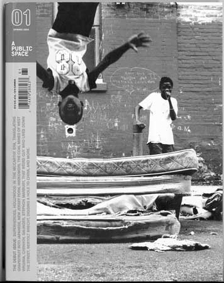 You’re also the contributing editor of A Public Space: how and why did you get involved with that project, and what is your role?
You’re also the contributing editor of A Public Space: how and why did you get involved with that project, and what is your role?
Brigid Hughes, who is the Editor in Chief, used to work at Paris Review, and she published my first story. She published two of my stories when she was at Paris Review. And when she started the magazine, she asked me if I’d like to work with her. I said yes only because I really like her and I like how she reads fiction. Now we’ve been working on the magazine for five years. The first year was all just talk and preparation, and the magazine has been around for four years. I read things she sends to me, and we will discuss the strengths or the weakness of the stories, and sometimes I do edits for her, because we will probably see different things. Recently we edited the same story—we both edited it and compared edits, and it was really close. Whatever I cut she cut, too. So it’s good that way, to know we agreed on certain things. And then there are things we disagree [about]. It’s really important to have someone to disagree with. I think that’s why I like to work with her, because we’re trying very hard to find things to disagree [about]. When you can disagree really well, you’re trying to explain yourself, and things get clearer when you disagree. I like that.
Does editorial work impact your own writing?
Yes, actually. I just started to be more active. Before, I would read for her, and I would not do the real editing, and we would bounce ideas back and forth. But now I do more editing. I think it’s good to learn how to cut. I’m actually getting better at cutting my own stuff, and I realize now I’m also getting better at cutting other people’s stuff [laughs], because most stories you read just need cutting.
You’ve said that you write to talk to your literary heroes. How does your reading process interact with your writing process?
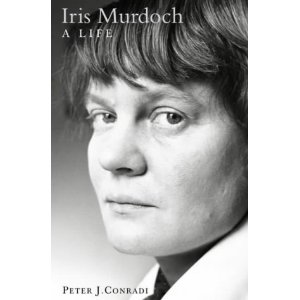 I really feel like I read to talk to people, because I don’t go out often. When you really go out to the world, you’re talking to people in the grocery store, or you’re talking to parents at school, but you don’t talk about writing. Apart from talking to a few writer friends and editors, the real talking you do with writers is actually reading. So I always read with a pen. I will disagree or agree and say, “Wow” or “So what?” I have an ongoing discussion with whoever I’m reading, and sometimes I yell at the writers. I was yelling at Iris Murdoch the other day. I was reading her and yelling [in high-pitched voice] “I really disagree with you!” Exclamation mark! “I strongly disagree with you! I don’t agree with you at all!” I love that. That makes me feel that I am not lonely, or alone. So I feel like my reading becomes a very important part of my writing. Because some of my reading is to have that ongoing discussion with these writers. I remember what Iris Murdoch said that I disagreed with. She said, “It’s immoral to love someone you don’t even like.” [Laughs.] Of course this is so Iris Murdoch. And of course I strongly disagree. So I was just yelling at her, in my mind. And I’m not doing it now, but at some point, that discussion will come into my story. Maybe I’ll write a story about loving someone you don’t even like, and how it’s so moral. [Laughs.]
I really feel like I read to talk to people, because I don’t go out often. When you really go out to the world, you’re talking to people in the grocery store, or you’re talking to parents at school, but you don’t talk about writing. Apart from talking to a few writer friends and editors, the real talking you do with writers is actually reading. So I always read with a pen. I will disagree or agree and say, “Wow” or “So what?” I have an ongoing discussion with whoever I’m reading, and sometimes I yell at the writers. I was yelling at Iris Murdoch the other day. I was reading her and yelling [in high-pitched voice] “I really disagree with you!” Exclamation mark! “I strongly disagree with you! I don’t agree with you at all!” I love that. That makes me feel that I am not lonely, or alone. So I feel like my reading becomes a very important part of my writing. Because some of my reading is to have that ongoing discussion with these writers. I remember what Iris Murdoch said that I disagreed with. She said, “It’s immoral to love someone you don’t even like.” [Laughs.] Of course this is so Iris Murdoch. And of course I strongly disagree. So I was just yelling at her, in my mind. And I’m not doing it now, but at some point, that discussion will come into my story. Maybe I’ll write a story about loving someone you don’t even like, and how it’s so moral. [Laughs.]
I know that William Trevor is one of your literary heroes. What about his work captivates you, and how has your admiration of him impacted your writing?
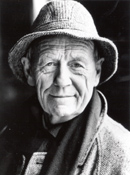
William Trevor / copyright: Penguin
It’s very interesting. When you explain why you like someone’s work, it’s all very intuitive. I cannot say I like this person’s face, or I like that person’s hair. I mean, sometimes you do that. But when you like someone’s work that much, it just feels like he’s writing about my own world, or I feel about the world that way he feels about the world, and I write about the world as he does. So it’s a very strange connection. [Reading Trevor] really explained to me that whatever country you come from, or where you grew up, really it didn’t matter. I think just his way to look at the world and his sympathy for his characters. And he’s melancholy. All these things, he’s very sad. It’s so funny…someone said to me last night at dinner, “Your fiction is so sad.” [Laughs.] And I said, “Well, that’s true.” I do write about a sad world, I think. Sad might be the wrong word, but I’m looking at things that probably are not very uplifting. Because I’ve read him for so long, and I also read Trevor very closely, more closely than any other writer, reading him becomes intuitive. I don’t argue with Trevor as I argue with Iris Murdoch. Because with Iris Murdoch – or with a lot of writers, even Graham Greene, who I love – it’s more like you have to find things to disagree [with], or you have to find things to at least have that conversation going. But with Trevor, it’s more like that’s how the world is for me, so the process is more intuitive.
Have you met him in person?
I have, a few times. Our meetings are all very brief, and I really think I talk to him mostly in my stories. I’m sure he understands that, because I would send my stories to him, and he would like them, I hope. Things you say in the end don’t matter in those situations, because really it’s the things you write, because you’re talking to a writer, and you really talk through your writing.
Do you do research for your stories?
I’m not a very good researcher, but I think I’m getting better. One thing you do, when you grow as a writer—this is something I’ve learned from teaching and editing—every sentence I write, I’ll ask, “Is this sentence right?” Not just in an artistic way, but even just the basic information. Would someone fifty years ago be named…even names, you name a character, and the name represents an age and a time. The Internet is very convenient—I’ll just get online and say, “What are the popular names in the 1950s or 1920s?” That’s research to me. Those things you just do quickly. If you’re talking about a disease, you have to make sure that you know all the symptoms. Research is for you to have confidence in your material. Sometimes you don’t have to do any research if you have that confidence. But I’m worried about making mistakes, so I still do research.
Edward P. Jones famously didn’t research The Known World.
Yes! I love that. He’s sort of my hero about not researching.
You wrote a second collection of stories as a side project while writing The Vagrants. What was your process like working on both projects simultaneously?
You cannot always just have one project. I get bored. And if you get stuck you get stuck, so I always try to keep a side project. Also I just love writing stories. If you write a novel for three years, it’s going to be a very long and lonely three years. I have to go write some stories. So I did write most of the stories while I was working on the novel. I thought, “Oh, let me finish a story, just to distract myself.”
In addition to being a fairly prolific writer, you’re also a teacher of creative writing at U.C. Davis, and the parent of two young children. How do you balance these roles, and how does each role impact the others?
Oh, gosh, I don’t balance well. I mean, I know I probably balance okay, but practically, you never have enough time writing. I sort of accept that I will never have enough writing time, because children get sick, schools have field trips, or you have to do some presentation about Chinese culture. These things constantly interrupt your writing life. I used to write from midnight to four in the morning, because that was the only time that I could write uninterrupted. But it’s not a very healthy thing to do. You get sick. You get tired. So now I’m giving myself less pressure. I used to really push myself to write at least a thousand words a day in these four hours. Now I have to work, I have to travel, I have to be a parent. So if I write two hundred words, I’m still happy.
You’ve adjusted your expectations?
You really have to adjust them. Otherwise, I would always be grumpy, because when I was with my children, I’d be thinking about those eight hundred words I hadn’t written. Just lately I learned, “Well, it’s okay, those 800 words will come.”
Do you enjoy teaching?
I enjoy teaching, but it takes too much time and energy. Writers always say, “Oh, teaching takes so much time.” But then there are moments that are really satisfying—when you see a student grow and learn things, that’s satisfying. Also, because I read all these dead authors. When I was at dinner last night, I was talking to someone and said, “Oh, I want to introduce you to my new friends. And I had a long list of dead people.” You’re just trying to overwhelm your students with your passion.
Do you read writers who are alive, besides William Trevor?
Not as much as I want to, but I would love to do more.
Who are some of your other favorites?
Graham Green, Elizabeth Bowen, and Molly Keane, who is this person no one is reading right now. And I read some really odd people, who sometimes people don’t know. I like Dickens, I love Dickens, and I like most of the Russian masters.
What projects are you working on right now?
I’m working on a novel. I’m working on it very slowly.
Can you say at all what it’s about?
No. [Laughs.]
That’s a little jinxy.
Yeah.
Further Links and Resources:
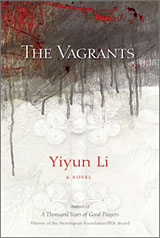
– Along with Jane Ciabattari’s review of Gold Boy, Emerald Girl, NPR offers an excerpt from the collection.
– At Random House’s website, read excerpts from A Thousand Years of Good Prayers and from The Vagrants.
– Read some of Li’s essays: For the New York Times, she reflects on Tiananmen Square and the end of her desire for a “Tangy life.” And for SFGate.com, she writes about the decision to limit her time online to fifteen minutes a day.
– Watch Li read in November of 2009, as part of Colgate’s Living Writers series:
– At the University of Iowa, Kecia Lynn speaks with Yiyun Li:

